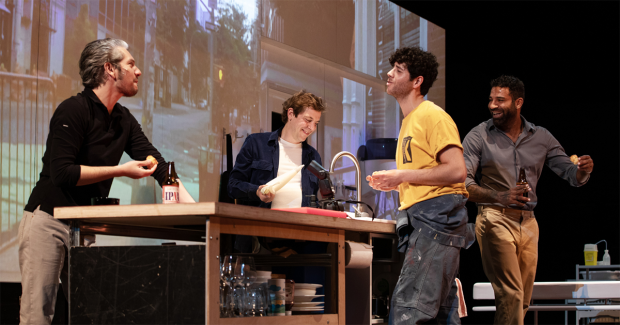Review: Ivo van Hove Brings A Little Life to the Stage, as Sublime as It Is Exhausting

(© Julieta Cervantes)
A four-hour, 10-minute stage adaptation, in Dutch, of an 800-page novel is certainly a hard sell. But when the source material is Hanya Yanagihara's beloved but highly criticized A Little Life, and when the stage adaptation is conceived and directed by the popular yet controversial Ivo van Hove, there is, for some, a great deal to intrigue. For others, there's a great deal to repulse. Both, in their own ways, are representative of the play itself.
A Little Life, adapted by Koen Tachelet and having a short run at Brooklyn Academy of Music, tells the terrifying tale of Jude St. Francis (Ramsey Nasr) and his life of nearly ceaseless trauma, which includes childhood sexual abuse, self-harm, and an attack that leaves him disabled. If that list of traumas feels overwhelming to you, you are not alone. While the story is clearly designed to be a litany of pain to rival Job's, the novel inspired questions about whether or not it was ethically dubious "trauma porn."
The play does not resolve this debate, and in fact, likely exacerbates it by the mere fact of staging the trauma – by putting A Little Life on a stage and having us watch the traumatic acts, the experience becomes even more intense emotionally. This in turn makes it feel more exploitative, more excessive. After sitting through over four hours of sexual grooming, wrist cutting, and rape, it is difficult to absolve this play of the trauma porn label.
Ivo van Hove, whose work had declined in quality recently (with Network and especially West Side Story feeling increasingly misbegotten), is back in his stride. His directorial touch feels surprisingly subtle. Instead of his overreliance on video, the video here is only on the side of the stage, showing an ambient feed of New York City streets (video and scenography by longtime collaborator by Jan Versweyveld); it is useless, but I was mostly just happy that it wasn't distracting, over-used, or gimmicky as in past productions.
There is something operatic in the scope of Jude's tragedy, and van Hove fittingly treats it as such. He has found some beautiful ways to draw on the best in the novel and utilize the theatricality of the stage to go beyond the confines of literary realism. Van Hove has effectively increased the role of Ana (Marieke Heebink), Jude's caregiver who dies before the narrative begins; in the play, she acts as an interlocutor, often talking to Jude while he is triggered and reliving trauma. Van Hove also has actors linger on the sides of the stage pursuing various activities (cooking, painting, sketching), showcasing which of Jude's friends are around and which are absent, helping the audience understand the greater landscape of Jude's life.
The parts of the book that work are brought to life with vivid detail. But the parts of the novel that don't work aren't convincing here either, especially when the slew of tragedies becomes too much to bear. In fact, many in the audience did not stay to bear it – about a third left during the play or at intermission – and the issue is not just the length, but the content. Several characters even say that Jude's story is too much to sit through.
The sheer amount of blood and gore in this play is staggering, and will be stomach-turning for some. In line with Titus Andronicus and the American Psycho musical, this play often feels like the violence and bleeding will never end. Jude's scars cannot even heal before he cuts them open again, leaving the stage dripping with blood for characters to dutifully clean up (van Hove has found a way to make the stage business of cleaning poetic and characterological).
In addition, having to read the Dutch supertitles (which were in somewhat small font and positioned high on the stage) made it difficult to actually watch the actors' faces. That said, the actors playing JB (Majd Mardo) and Luke/Caleb/Traylor (Hans Kesting, in a brilliant triple casting of Jude's main abusers) were the standouts.
I was dismayed that the production has largely chosen to ignore Jude's physical disability, a spinal condition that leads to chronic pain and a mobility impairment, despite it being a major aspect of the novel. Not having Nasr show any signs of physical pain or limp creates a major issue during a key scene, in which JB mocks Jude's walk, an act so hurtful it ends their friendship. This crucial moment in the novel packs no emotional punch here, because Jude's limp doesn't exist. This eschewing of disability felt not just problematic and untrue to the source material, but an upsetting form of erasure.
While it's easy to point out the issues, it's quite difficult to articulate what makes this play actually work, and it's hard to grasp exactly what makes it so undeniably powerful. While not totally explainable, there is an ineffable emotional resonance that has drawn so many to the novel, and now will draw so many to this play. There is something somewhere in all this pain that sucks us in and makes us feel deeply.
There's an almost satisfying masochism to watching this play. You will leave feeling like you just got punched in the gut, but in a good way, if that's possible. If you can make it to the end (and I admit, it's an if), you'll feel paradoxically exhausted and invigorated all at once. Is there too much pain and trauma here? Yes, almost definitively. Does it ruin the play? For some, it will. But for others, it may be the very thing that makes it sublime.











